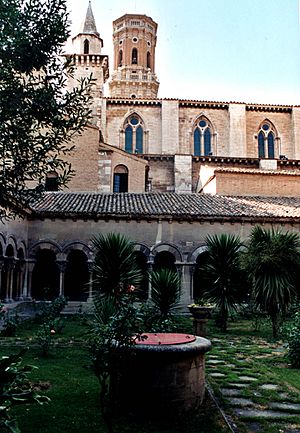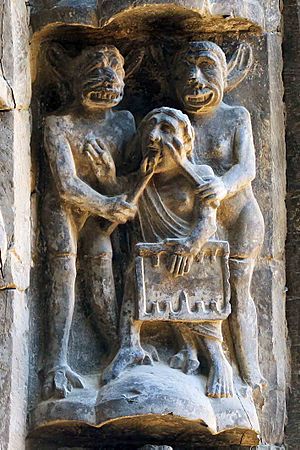Tudela Cathedral facts for kids
Quick facts for kids Tudela Cathedral |
|
|---|---|
| Co-Cathedral of Saint Mary of Tudela | |
|
Spanish: Catedral de Tudela
|
|

The cathedral viewed from the cloister
|
|
| Lua error in Module:Location_map at line 420: attempt to index field 'wikibase' (a nil value). | |
| Country | Spain |
| Denomination | Roman Catholic Church |
| Architecture | |
| Functional status | Active |
| Heritage designation | Monumento |
| Designated | 1884 |
| Architectural type | church |
| Style | Romanesque, Gothic |
| Administration | |
| Archdiocese | Roman Catholic Archdiocese of Pamplona and Tudela |
The Co-Cathedral of Saint Mary of Tudela (Spanish: Catedral de Santa Maria) is a beautiful and historic church in the city of Tudela, Navarre, Spain. It is a Roman Catholic church that has been around for many centuries. It is called a "co-cathedral" because it shares the role of being the main church for the Archdiocese of Pamplona and Tudela.
Contents
History of the Co-Cathedral
From Mosque to Church
Tudela was once controlled by Muslim rulers. In 1119, Christian forces led by Alfonso the Battler took control of the city. After this, the main mosque in Tudela was given to the church. This site was chosen to build a new Christian church. Before the mosque, there was actually an older church dedicated to Saint Mary there.
Building the Collegiate Church
Construction of the new church began in 1168. It was first built as a "collegiate church." This means it was a church with a group of priests, called a college or chapter, who lived together and performed daily services. The first parts of the church were built in the Romanesque style.
Becoming a Cathedral
Later, the church became a full cathedral. This happened when the Diocese of Tudela was created. This diocese existed from 1783 to 1851 and again from 1889 to 1956. Today, it serves as a co-cathedral, working alongside the main cathedral in Pamplona.
Amazing Architecture and Art
Romanesque Portals
The Co-Cathedral of Saint Mary of Tudela is famous for its three amazing Romanesque doorways, called portals. These portals have very detailed sculptures.
- The North door is known as the Portal de Santa Maria.
- The South door is called the Portal del Juicio ("Portal of the Last Judgement"). This portal is special because it shows many scenes of what people believed happened in the afterlife, including images of figures punishing people.
Gothic Changes
Over time, parts of the church were rebuilt in the Gothic style. This included the main part of the church, called the nave, and its chapels. The construction continued until the 13th century.
Inside the Church
The main chapel has a beautiful altarpiece, called a retablo. This large artwork was created by artists in the 15th century. It has 18 panels that show scenes from the Life of Jesus and Mary, as well as pictures of prophets and apostles. There is also a sculpture of the Assumption of the Virgin from 1606, made by Juan Bascardo.
The central choir, where the church singers sit, was finished by Esteban de Obray in the Gothic style. The church also has a large organ, which was built in 1759 by Lucas de Tarazona.
Protecting This Historic Place
In 1884, the Co-Cathedral of Saint Mary of Tudela was recognized as a national monument. This means it is a very important historical building that needs to be protected.
Today, visitors can take guided tours of the co-cathedral. These tours are usually held when there are no church services happening, so everyone can explore and learn about its rich history and beautiful art.
See also
 In Spanish: Catedral de Santa María de Tudela para niños
In Spanish: Catedral de Santa María de Tudela para niños
- Catholic Church in Spain


